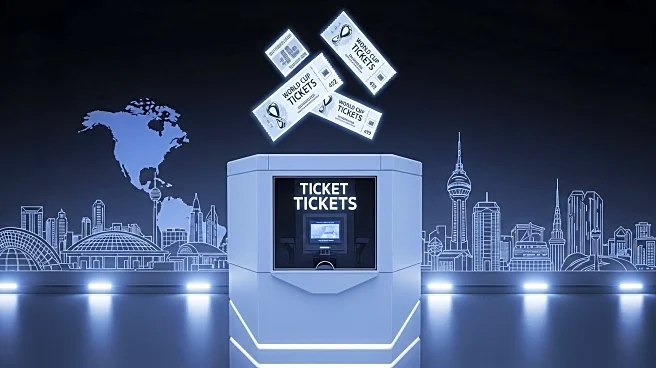What is the story about?
What's Happening?
FIFA has announced that ticket prices for the 2026 World Cup will range from $60 to $6,730, with a dynamic pricing model that could see these prices fluctuate based on demand and inventory. This marks the first time FIFA is using dynamic pricing for World Cup tickets. The tournament, set to take place from June 11 to July 19, 2026, will be hosted across 11 sites in the U.S., three in Mexico, and two in Canada. The initial ticket sales phase will be exclusive to Visa cardholders from September 10 to 19, with a second phase expected in late October. FIFA aims to optimize both revenue and attendance through this pricing strategy.
Why It's Important?
The introduction of dynamic pricing for World Cup tickets is significant as it reflects a shift in how major sporting events manage ticket sales, potentially impacting fans' access and affordability. This approach allows FIFA to maximize revenue by adjusting prices in response to demand, which could lead to higher costs for popular matches. However, it also aims to prevent ticket scalping by aligning prices more closely with market demand. The decision could set a precedent for future sporting events, influencing how tickets are sold and priced globally.
What's Next?
FIFA plans to launch an official resale platform to manage ticket exchanges, with no cap on resale prices in the U.S. and Canada, though stricter regulations will apply in Mexico. As the tournament approaches, further ticket sales phases will be introduced, including a first-come, first-served phase after the final draw on December 5, 2025. Fans and stakeholders will be closely watching how dynamic pricing affects ticket availability and affordability, as well as the overall success of the tournament's ticketing strategy.
Beyond the Headlines
The use of dynamic pricing raises ethical questions about accessibility and fairness, particularly for fans with limited financial means. While it aims to curb scalping, it may also lead to higher prices for fans, potentially limiting access to the event for some. The strategy reflects broader trends in event management and could influence how other major events approach ticket sales in the future.















